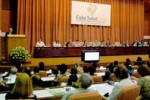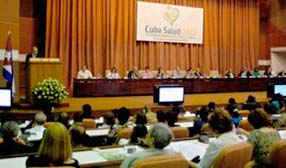 The Cuban experience in dealing with cholera, and several panels on dengue, HIV/AIDS and tuberculosis are focus of discussions at the International Convention Cuba-Health 2012, in its third day of work.
The Cuban experience in dealing with cholera, and several panels on dengue, HIV/AIDS and tuberculosis are focus of discussions at the International Convention Cuba-Health 2012, in its third day of work.
There will be also issues related to scientific research and its impact on health systems, the South-South cooperation in the biotechnology and pharmaceutical industries as well as the new challenges of health regulations, and the book “Health in the Americas”, by the Pan American Health Bureau (PASB).
During the event, which will run until December 7, were shown the results of health programs developed in Cuba and the changes made in that sector to improve efficiency, quality and sustainability of health services.
In that sense, Roberto Morales Ojeda, Minister of Public Health, said that there is a work to rescue the clinical method with an epidemiological approach as a way to increase the quality of care, efficiency, rational use of diagnostic and therapeutics as well as the satisfaction of the population.
That way, the Cuban strategy has achieved the objectives outlined in the Alma-Ata Conference, through concrete actions of promotion, prevention and protection of universal health, community and inter-sectors participation, he said.
The millennium development goals are met in Cuba and we continue progressing in them thanks to the priority that the Cuban socioeconomic system gives to these goals, highlighted Morales Ojeda.
He also noted that Cuba is no exception to the health problems facing the planet, the aging population, financial constraints, rising costs and the introduction of new technological processes, which force to develop updating actions of organizational and operational schemes.
However, the progress of the Cuban public health makes possible to face complex situations resulted of risk factors as smoking, alcohol, unhealthy diet and insufficient physical activity, he added.
The convention is attended by official delegations led by health ministers from various countries, where Cuban doctors provide their service. Among others are representatives from Brazil, Jamaica, Qatar, Angola, Mozambique, Ecuador, El Salvador, Syria and Gabon.
The event involved also 700 foreign delegates along with the 500 Cubans, and 70 companies of the international biopharmaceutical sector showcasing their products.
 Escambray ENGLISH EDITION
Escambray ENGLISH EDITION





Escambray reserves the right to publish comments.